
When purchasing a home or maintaining an existing property, inspections play a crucial role in ensuring structural integrity and safety. Two of the most common types of inspections are home inspections and roof inspections. While they may seem similar, each serves a distinct purpose. Understanding the differences between the two can help homeowners make informed decisions about property maintenance and investment.
What is a Home Inspection?
A home inspection is a comprehensive evaluation of a property’s overall condition. Conducted by a professional home inspector, it covers various components of a house, ensuring that everything functions correctly and meets safety standards.
Key Aspects of a Home Inspection
-
Structural Integrity – The foundation, walls, ceilings, and floors are checked for cracks, shifting, or instability.
-
Plumbing System – Inspectors assess pipes, water heaters, and drainage to detect leaks or potential issues.
-
Electrical System – Wiring, outlets, circuit breakers, and safety mechanisms are evaluated for hazards.
-
HVAC Systems – Heating, ventilation, and air conditioning systems are examined for efficiency and safety.
-
Interior and Exterior – Windows, doors, insulation, and siding are reviewed for damages or wear.
-
Attic and Basement – These areas are checked for insulation, moisture problems, and structural concerns.
A home inspection is typically performed before purchasing a home, ensuring buyers are aware of any necessary repairs or hidden problems.
What is a Roof Inspection?
A roof inspection focuses specifically on the condition and performance of a property’s roofing system. This type of inspection is critical for preventing costly damage and ensuring a home remains protected from environmental elements.
Key Aspects of a Roof Inspection
-
Shingles and Roofing Material – Inspectors check for missing, curled, or damaged shingles, which can compromise protection.
-
Flashing and Seals – These elements around vents, chimneys, and skylights are reviewed for gaps or deterioration.
-
Gutters and Drainage – The drainage system is assessed to prevent water buildup and potential roof leaks.
-
Structural Integrity – The roof deck and support structures are examined for sagging or rot.
-
Leaks and Moisture Damage – Inspectors identify signs of water infiltration that could lead to mold or interior damage.
-
Lifespan Estimation – Roof inspectors provide an estimate of how much longer the roof will last and whether repairs or replacement are necessary.
Roof inspections are crucial for preventative maintenance, helping homeowners address minor issues before they escalate into major problems.
Differences Between Home Inspections and Roof Inspections
While both inspections contribute to property safety and value, they differ in scope, focus, and frequency. Below is a comparison of key differences:
| Feature | Home Inspection | Roof Inspection |
|---|---|---|
| Scope | Entire home | Only the roofing system |
| Inspector Expertise | General home systems knowledge | Specialized roofing knowledge |
| Common Timing | During home purchase or routine checks | As part of maintenance or after storms |
| Inspection Methods | Visual check, basic tools | Visual, drone technology, thermal imaging |
| Duration | 2-4 hours | 30 minutes to 2 hours |
| Cost Range | $300 – $500 | $100 – $400 |
| Main Focus | Structural, electrical, plumbing, HVAC, safety | Roof materials, drainage, leaks, structural integrity |
When Do You Need Each Type of Inspection?
When to Get a Home Inspection
-
Buying a Home – A professional home inspection helps identify hidden issues before purchasing a property.
-
Selling a Home – Sellers can get an inspection to uncover and fix potential issues before listing their home.
-
Routine Check-ups – Even homeowners who aren’t buying or selling should schedule periodic inspections to maintain safety and efficiency.
When to Get a Roof Inspection
-
After Severe Weather – Heavy rain, hail, or strong winds can damage a roof, requiring an immediate inspection.
-
Aging Roofs – If your roof is over 15-20 years old, regular inspections help assess wear and potential replacement needs.
-
Before Selling a Home – A roof inspection can prevent surprises during a buyer’s home inspection.
-
Annual Maintenance – Checking the roof at least once a year helps prevent small issues from becoming expensive repairs.
How Do These Inspections Impact Home Value?
Both types of inspections significantly influence home value by identifying problems that could affect safety, efficiency, and overall marketability.
-
A well-maintained home with a positive inspection report boosts buyer confidence and can increase property value.
-
A damaged or leaking roof reduces home value and may result in lower offers or require immediate repairs before a sale.
-
Addressing issues in advance allows sellers to make improvements that maximize return on investment.
Which Inspection is More Important?
Both home and roof inspections are equally important but serve different purposes:
-
Home inspections provide a broad overview, making them essential when buying a home.
-
Roof inspections are more specialized, ensuring protection against costly damage from leaks or structural issues.
If forced to prioritize, a home inspection is more comprehensive and provides insights into all critical home systems. However, roof inspections are crucial for preventing water damage, which can lead to more severe problems inside the home.
Final Thoughts
Understanding the differences between home inspections and roof inspections is vital for homeowners, buyers, and sellers. Regular inspections, whether general or specific, help maintain property value, prevent expensive repairs, and ensure long-term safety.
-
Home inspections are broader and crucial for property transactions.
-
Roof inspections are focused but essential for maintenance and damage prevention.
Investing in both ensures your home remains safe, efficient, and valuable for years to come. Whether you are buying, selling, or maintaining your home, scheduling these inspections at the right times can save you from costly surprises down the road.





Leave a Reply